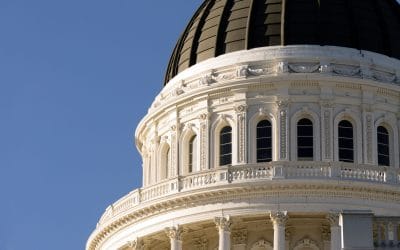Capitol Advisors Group has produced a series of comprehensive client briefs detailing new education laws that were passed by the Legislature and signed into law by Governor Brown in 2017. Each brief is organized by subject area and includes an executive summary highlighting major changes we think you should know about. Bills signed by the Governor take effect on January 1, 2018, unless the bill specifically states otherwise. A PDF version of this report is available here.
Stalemate over State’s Accountability System. The Legislature and Governor continue to debate changes to the State’s accountability system, with most legislative proposals to expand accountability either dying in the Legislature or facing a veto. Much of the debate has centered on the implementation of the Local Control Funding Formula (LCFF) and the degree to which the Local Control Accountability Plans (LCAPs) provide enough transparency regarding how the funding generated by the unduplicated students (low income, foster/homeless, and English learners) is spent on services for those students. For example, Assembly Member Shirley Weber (D-San Diego) authored AB 1321 to require the state to ensure that districts and schools report per-pupil expenditures (by fund source) in state and federal reporting. The bill was co-sponsored by Children Now and Education Trust West and supported by a vast array of civil rights and English learner advocate organizations. It is important to acknowledge that the bill received unanimous support as it moved through the State Assembly and Senate, but ultimately stalled in the Senate Appropriations Committee over concerns from the Administration. Governor Brown continues to hold firm on implementing the existing accountability system before making changes. We expect the accountability debate to continue in 2018 and likely become more serious in 2019, once Governor Brown terms out of office. Stay tuned…
The California High School Exit Exam (CAHSEE) is Officially Off the Books. After years of debate over the future of the CAHSEE, Governor Brown signed AB 830 by Assembly Member Ash Kalra (D-San Jose), officially ending the exam’s existence in the Education Code.
The CAHSEE was established in 1999 to assess pupils in the areas of English language arts and mathematics. Beginning with the graduating class of 2006, passage of the CAHSEE was required for a student to receive a high school diploma. In 2010, the State Board of Education (SBE) approved the adoption of the Common Core State Standards, which led to the development of new assessments. Since the establishment of the new state assessments, which include a test in Grade 11, the CAHSEE has been suspended.
Smarter Balanced Assessment Consortium (SBAC) Interim Assessments Bolstered. In response to teacher complaints over the SBAC interim assessments’ usefulness in informing instruction (feedback is too broad and not timely) and a Human Resources Research Organization (HUMRRO) report on the state’s assessment system that backed up those complaints, the Governor signed AB 1035 by Assembly Education Committee Chair Patrick O’Donnell (D-Long Beach). The bill adds further specificity to the definition of “interim assessments” in the Education Code to better describe the type of information available from the interim assessment results. It also requires an LEA that elects to use state-provided interim assessments to ensure that teachers have access to all functions and information relating to the assessments and student performance on the assessments, and establishes parameters for the local use of interim assessment data.
The Governor signed the following assessment and accountability bills this year:
Assessments
- AB 24 (Eggman) – Instructional programs: State Seal of Civic Engagement
This bill requires the development and establishment of a State Seal of Civic Engagement that may be affixed to the diploma of qualifying high school graduates who have demonstrated excellence in civics education and participation and have demonstrated an understanding of the United States Constitution, the California Constitution, and the democratic system of government. The bill requires the Superintendent of Public Instruction (SPI), when developing the criteria for earning the seal, to consider the successful completion of history, government, and civics courses, including courses that incorporate character education, and voluntary participation in community service or extracurricular activities.
Chapter 604, Statutes of 2017 - AB 830 (Kalra) – High school exit examination: repeal
This bill officially repeals the requirement that the state develop and administer a high school exit exam as well as the requirement that students pass the exam as a condition for graduation from high school. The bill also repeals references to the exam currently in law.
Chapter 641, Statutes of 2017 - AB 1035 (O’Donnell) – Pupil assessments: interim assessments: purposes of use
Current law requires the SPI, the SBE, and any other entity or individual designated by the Governor to participate in the Common Core State Standards Initiative consortium or any related interstate consortium. Current law also requires the California Department of Education (CDE) to acquire, and offer at no cost to LEAs, interim and formative assessment tools for kindergarten and grades 1 to 12, that have been provided through the state’s membership in that consortium. This bill requires those interim assessments to be designed to provide timely feedback to teachers that they may use to continually adjust instruction to improve pupil learning and for LEAs choosing to use the interim assessments to ensure that the teachers who administer the tests to have access to all functions and information related to the assessments and student performance on the assessments. The bill also establishes parameters for the local use of interim assessment data.
Chapter 752, Statutes of 2017
Data
- AB 677 (Chiu) – Data collection: sexual orientation
Starting no later than July 1, 2018, existing law directs various state health and social services entities to collect voluntary self-identification information on sexual orientation and gender identity. This bill expands that list of state entities to include the CDE, SPI, and the Commission on Teacher Credentialing (CTC). Furthermore, this bill prohibits an LEA that chooses to administer a voluntary survey already including questions pertaining to sexual orientation and gender identity from removing those questions.
Chapter 744, Statutes of 2017
Graduation Requirements
- AB 365 (Muratsuchi) – Pupil instruction: coursework and graduation requirements: children of military families
Current law allows students from certain highly mobile populations (foster and homeless youth, or youth who were formerly wards of the juvenile court) to be exempted from certain coursework requirements that are adopted by local school boards. This bill extends those exemptions to students whose parents are active military personnel.
Chapter 739, Statutes of 2017 - AB 1176 (Mullin) – High school equivalency tests
The SPI is currently allowed to grant a waiver to a county office of education (COE) to provide a general educational development test preparation program to a person who is at least 17 years of age, has accumulated insufficient units of high school credit to graduate from high school by 18 years of age, and is confined to a state or county hospital or to an institution maintained by a state or county correctional agency. Current law limits the preparation program to no more than one hour per school day. This bill deletes the one-hour time limit.
Chapter 663, Statutes of 2017




0 Comments